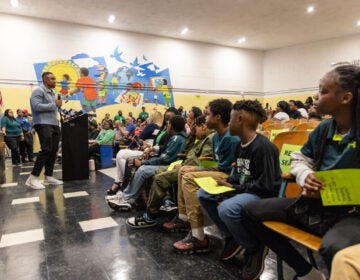Philly lawmaker cautions that cigarette tax for schools not a done deal
Last week, the Republican-held, tax averse Pennsylvania House of Representatives gave its blessing to Philadelphia’s $2-per-pack cigarette tax.
The tax is expected to generate $40 million to $45 million for the struggling schools this year and double that for years to come.
But the measure still must win approval from the state Senate before moving to the governor’s desk.
And state Sen. Anthony Hardy Williams, D-Philadelphia, offered some advice during a City Hall news conference Monday: Don’t spike the football on the 5-yard line.
“While there’s been a lot of back slapping and clapping and ‘We finally got it done,’ we have not gotten it done,” William said. “And we want to continue the momentum, but you can only continue the momentum if people understand there’s still a critical need.”
The cigarette tax passed the House along with a number of other amendments. So even though the Senate previously passed the cigarette tax language, Williams warned that the additions could divide some senators and further stall the legislation.
Senate Democrats estimate that the school district loses $1.6 million every week the legislation is postponed.
Gov. Tom Corbett has said that he’d sign the bill if passed by the General Assembly.
The district currently faces a $93 million budget gap that has prompted school leaders to float the idea of shortening the school year.
Philadelphia Mayor Michael Nutter urged senators, who reconvene in Harrisburg Tuesday, to avoid that scenario by approving the tax without delay.
“Should there be a positive vote from the Senate and the cigarette tax goes into effect, there’s no question as to whether or not schools will open on time,” said Nutter. “They will.”
A spokesman for the district confirmed that assessment.
Even with proceeds from a cigarette tax, city schools will still need another $40 million to provide the same “bare-bones” resources as this past school year.
District officials have declined to say how many layoffs might be necessary if that $40 million fails to materialize.
Nutter on Monday said that deficit may diminish as the city does its end-of-year fiscal accounting.
“Over the next few weeks, we might see a slightly more optimistic picture for the district,” he said. “But we’re still looking through all the numbers.”
In addition to the $93 million needed to close the budget gap, district Superintendent William Hite has been calling for an additional $224 million in order to implement his vision for district growth.
WHYY is your source for fact-based, in-depth journalism and information. As a nonprofit organization, we rely on financial support from readers like you. Please give today.





